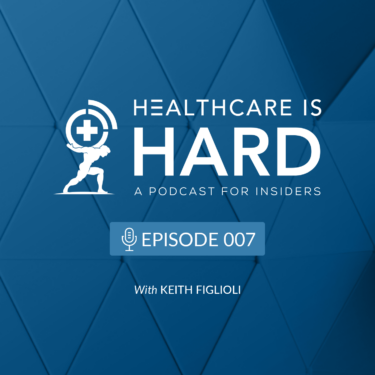Twenty years ago, no one really understood how to run an integrated health system. That’s because no executives at the time grew up in, or were trained to lead a health system. They were all trained to run hospitals.
In this episode of Healthcare is Hard: A Podcast for Insiders, Keith Figlioli talks to Gary Bisbee, who co-founded the Health Management Academy to provide peer learning opportunities and guide health system executives through this new vision of healthcare.
Today, The Academy consists of 100 leading health systems that together, account for about 65 percent of all hospital revenue in the U.S. If they were publicly traded companies, 34 of these health systems would qualify for the Fortune 500.
With an insider view of the nation’s largest health systems, and career experience that spans Wall Street, academia, health policy, information technology, health services, and medical devices, Gary Bisbee hit upon a wide range of topics, including:
- Reconciling the “right thing” with revenue – the underlying mission for hospitals and health systems has always been to do the right thing for their communities. That mission remains intact today, but becomes increasingly more complex as systems become more corporate, span across state lines and in many cases are the largest employer in their state or region. These systems work hard to meet the responsibilities they have to their patients, employees and the community at large amid increasing challenges. For example, as Baby Boomers age, causing government payers to top 60 percent and head towards 70 of health system revenue, maintaining margins will only become more difficult. But at the same time, doing “the right thing” will only be possible for financially viable organizations. Gary talks about how challenges like this will test the leadership of health systems and force difficult decisions, and how health system CEOs like Penny Wheeler of Allina Health (a previous guest of the Healthcare Is Hard podcast) are adapting.
- The VBC Evolution – As Gary describes it, value-based care (VBC) emerged as the “ticket to salvation” five to eight years ago, but its promise has been difficult to fulfil. While the government tries to drive VBC adoption, there are still 160 million people – about half the population – covered under corporate health benefits that are not yet fully on board. Gary believes there is a model to successfully tie hospitals, doctors, and patients together. We call this VBC right now, but he sees an evolution over the next ten years to something entirely new.
- Consumerism Driving Change – Working with consumers who have access to so much knowledge and power is a completely new experience that the current health system isn’t built for. Consumers now have iPhones and apps that enable them to essentially access any information at any time, but these innovations are still only 10 years old and continue to advance quickly. As they do, they’re conditioning consumers to prioritize convenience. Why go to the hospital if you can video chat with a doctor? Clinical restructuring will be key for hospitals to sustain the role they play as innovation accelerates and demographics change.
- What Happened to Interoperability? – as a board member at Cerner since 1989, Gary has had a front row seat to the digitization of healthcare. And after the government spent $35 to $40 billion on digitization over the past decade, the missed opportunity for interoperability – and the path forward to achieve it – is now a burning question for everyone. Reducing costs and driving high quality care are the market’s main motivators, and both can be addressed by applying new technologies like AI and analytics to the incredible amount of data now within the system. But aligning all the players in order to access the right data will not be easy. Gary agrees that we’re in the very early stages of this revolution and that interoperability will be key. Just as the government mandated digitization, he predicts that it will take further government intervention to ultimately make this happen.
To hear Gary talk about these topics and more, listen to this episode of Healthcare is Hard: A Podcast for Insiders.
